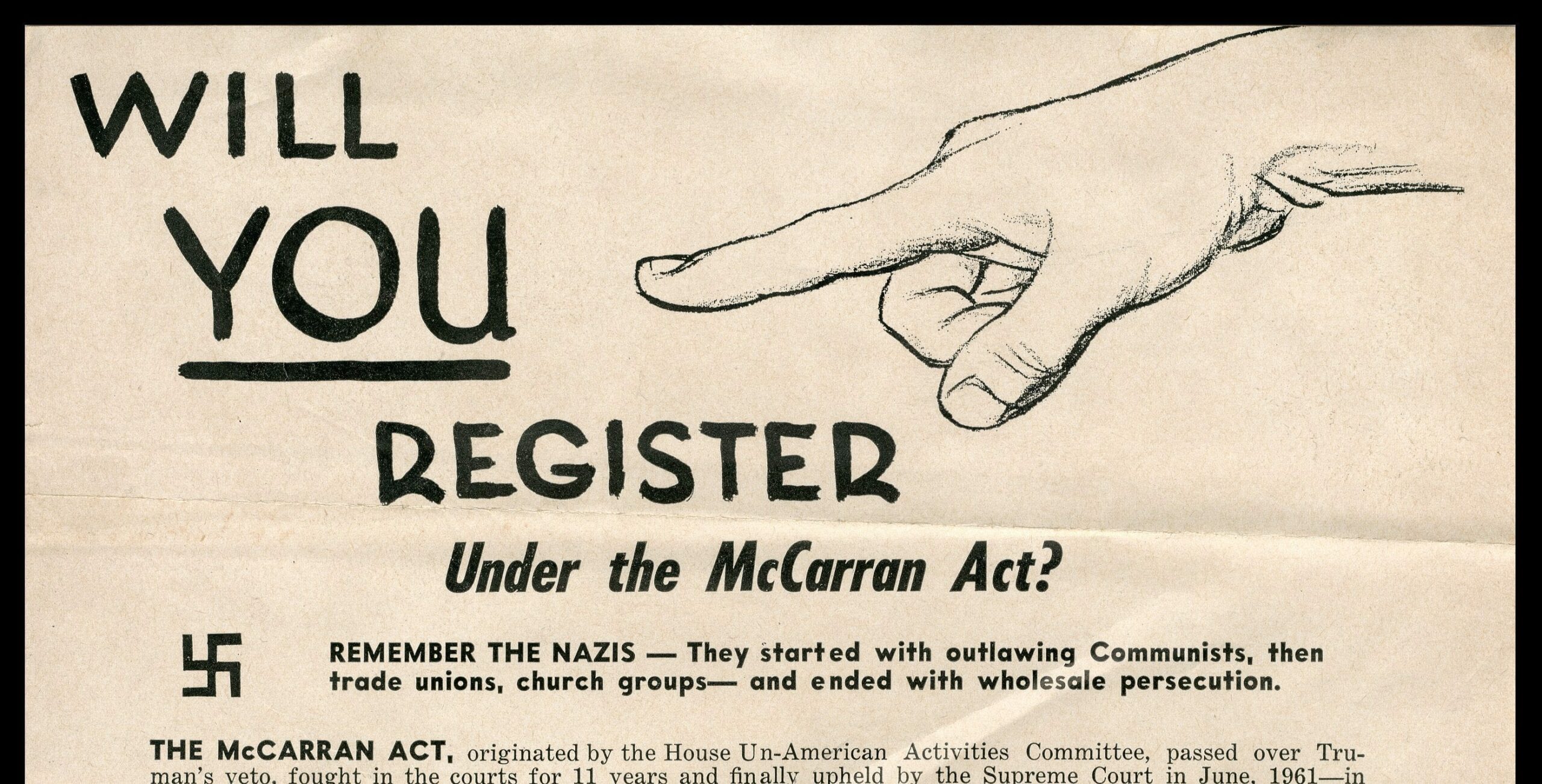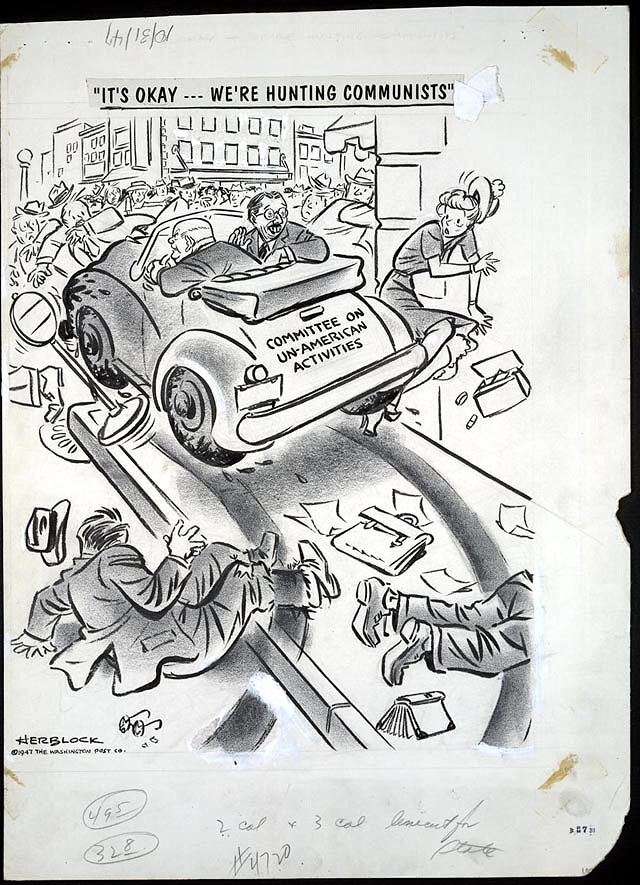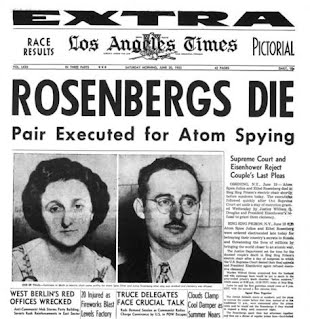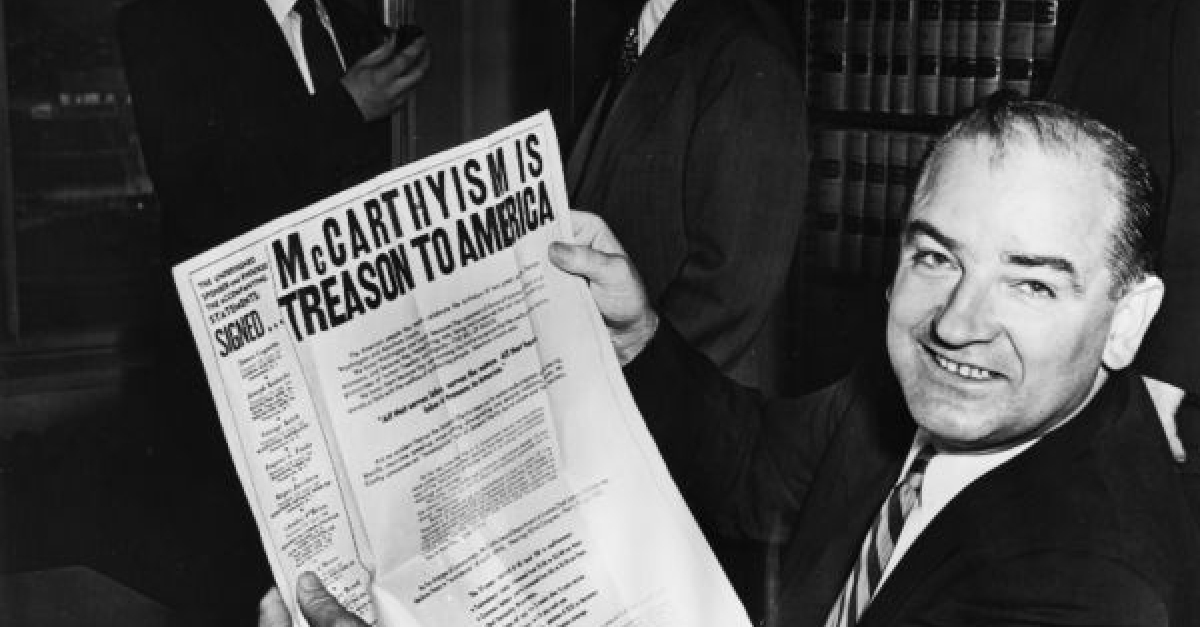You have 3 free guides left 😟
Unlock your guides8.3 The Red Scare
6 min read•june 18, 2024
Robby May
Dalia Savy
Robby May
Dalia Savy
The Red Scare was a period of fear and persecution in the United States that occurred twice in the 20th century, first from 1917 to 1920 and again in the 1950s. It was fueled by a fear of communism and radical leftist ideologies and resulted in widespread government repression and the persecution of individuals and groups believed to be associated with these ideologies.
Since we're focusing on post-World War II, we'll be discussing the that occurred in the 1950s and was fueled by Cold War tensions.
The Second Red Scare
In 1947, the , under pressure from Republican critics, set up a to investigate the background of more than 3 million federal employees. They wanted to identify and remove individuals who were thought to be security risks or had ties to communist or other subversive organizations.
The program was run by the and was supported by the FBI, which allowed them to conduct extensive background checks on federal employees. As a result of the program, hundreds of federal employees were dismissed from their jobs or resigned under pressure.

Over Truman’s veto, Congress passed the McCarren Internal Security Act, also known as the Internal Security Act of 1950, which aimed to protect the country from communist subversion through the following methods:
- By making it unlawful to advocate or support the establishment of a totalitarian government.
- By restricting the employment and travel of those joining Communist organizations
- By authorizing the creation of detention camps for subversives. The Act also established the Subversive Activities Control Board, which had the power to investigate and list organizations as "communist-front" groups. The law was highly controversial and was criticized for its potential to infringe on civil liberties. The Supreme Court upheld the constitutionality of the act in 1951, but several provisions of the law were later struck down as unconstitutional in the 60s and 70s.
House Un-American Activities
In the House of Representatives, the Un-American Activities Committee (HUAC), originally established in 1939 to seek out Nazis, was reactivated in the postwar years to find Communists. The committee not only investigated government officials but also looked for communist influence in such organizations as the Boy Scouts and in the Hollywood film industry. Actors, directors, and writers were called before the committee to testify. Those who refused were tried for contempt of Congress.
Many of those investigated, including artists and government employees as well, were blacklisted and lost their jobs as a result of their association with the committee.

Espionage
The fear of Communist conspiracy bent on world conquest was supported by a series of actual cases of Communist espionage.
Some high-profile cases of espionage during this period include the convictions of Julius and for passing atomic secrets to the Soviet Union and the case of , a former official accused of being a Soviet spy. These cases and others like them fueled the fear of espionage and subversion and contributed to the climate of fear and repression during the second Red Scare.
The Hiss Case
, a confessed Communist, became a star for the HUAC in 1948. His testimony, along with the investigative work of a young member of Congress from California named , led to Alger Hiss, a prominent official in the State Department who had assisted FDR at Yalta. Chambers testified that he had given classified government documents to Hiss while they were both members of the Communist party in the 1930s.
Hiss denied that he was a Communist. In 1950, he was convicted of perjury and sent to prison. Many Americans wondered if the highest levels of government were infiltrated by Soviet spies.
The Rosenberg Case
Americans were convinced that spies had helped the Soviets steal the technology of the atomic bomb from the U.S. A British scientist who had worked on the Manhattan Project, , admitted giving A-bomb secrets to the USSR. In his testimony, Greenglass implicated Julius and Ethel Rosenberg. The defense argued that the couple were victims of a government witch-hunt and that the evidence against them was weak and circumstantial.

The case was highly polarizing and generated intense public debate. Some saw the Rosenbergs as traitors who deserved the death penalty, while others saw them as victims of a government overreach and a violation of civil liberties. The execution of the Rosenbergs, which took place on June 19, 1953, was the first execution of civilians for espionage in United States history and it remains one of the most controversial and debated cases in American history.
Senator Joseph McCarthy
In 1950, of Wisconsin delivered a routine Lincoln Day speech in Wheeling, West Virginia. He suddenly attracted national attention when he declared, “I have here in my hand a list of 205—a list of names that were made known to the secretary of state as being members of the Communist Party and who nevertheless are still working and shaping policy in the State Department.”
The charge changed on different occasions from 57 to 81 and was never substantiated. The speech triggered a 4 ½ year crusade to hunt down alleged Communists in government. This sensationalism became known as and is the reason why the Second Red Scare is also referred to as the .

While officials would be refuting his initial accusations, he brought forth a steady stream of new ones, so the corrections never caught up with the latest blast. He failed to unearth a single confirmed Communist in the government, but he kept the Truman administration in turmoil.
He relied on an army of informers, primarily disgruntled government workers with grievances against their colleagues and superiors. He accused the State Department of deliberately losing the Cold War.
His briefcase bulged with documents, but he did very little actual research, relying instead on reports (often outdated) from earlier congressional investigations. He exploited the press with great skill, always promising future disclosures to guarantee headlines. McCarthy’s power was the fear he created among his Senate colleagues. Maryland Senator Millard Tydings failed to win reelection after he headed a committee critical of McCarthy’s activities. After that, all the other senators ran scared.
McCarthy also went after prominent public officials like Secretary of State calling him the “Red Dean.” He also went after , claiming that he was an agent of Communist conspiracy. The attacks on the wealthy, famous, and privileged won McCarthy a national following.
He offered a simple solution to the Cold War: defeat the enemy at home rather than continue to engage in costly foreign aid programs and entangling alliances abroad.
GOP leaders thought his attacks were distasteful but continued to encourage him to attack vulnerable Democrats.
Eisenhower and McCarthy
Eisenhower was less effective in dealing with McCarthy’s continuing witch hunt. Instead of toning down his anticommunist crusade after the Republican victory, McCarthy used his new position as chairman of the as a base for ferreting out Communists on the federal payroll.
He made a series of charges against foreign affairs agencies and demanded certain books be purged from American information libraries overseas. Eisenhower’s advisors urged him to stop McCarthy. But Ike refused stating, “I will not get into a pissing contest with a skunk.” He hoped the American people would eventually come to their senses. He wanted to give him a long rope to hang himself.
McCarthy’s Downfall
The Senator finally overreached himself when he uncovered an army dentist suspected of disloyalty and proceeded to attack the upper leadership of the U.S. Army. It culminated in the televised 1954 . For six weeks, the senator revealed his crude, bullying behavior to the American people. He was also publicly humiliated by the chief counsel for the army, , who famously asked "Have you no sense of decency, sir? At long last, have you left no sense of decency?"
Two Republican senators joined the Democrats to bring about the Senate’s censure of McCarthy in 1954. He fell quickly from prominence. He died three years later as a result of alcoholism.
© 2024 Fiveable Inc. All rights reserved.
AP® and SAT® are trademarks registered by the College Board, which is not affiliated with, and does not endorse this website.
